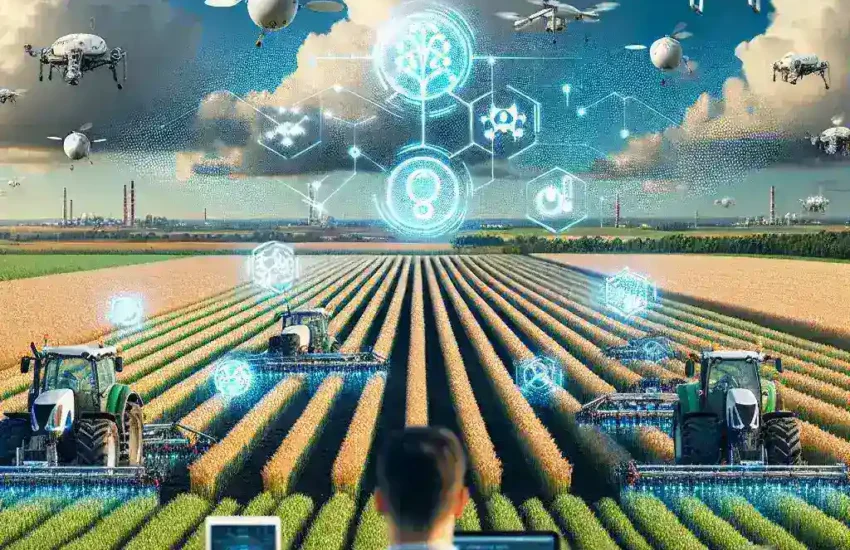In an era where technological advancements are reshaping industries, agriculture stands at the forefront of this revolution. The role of Artificial Intelligence (AI) in enhancing agricultural productivity cannot be understated. From precision farming to crop management and sustainability, AI is transforming how farmers operate and optimize their yields. This article delves into the multifaceted ways AI is enhancing agricultural productivity.
Precision Farming
Precision farming, a concept that leverages AI, is streamlining traditional agricultural practices. By utilizing sensors, drones, and data analytics, AI aids in collecting real-time data on soil health, weather conditions, and crop growth patterns. This data helps farmers make informed decisions, thereby optimizing resource use and increasing crop yields.
Soil Health Monitoring
AI-powered sensors and IoT devices can monitor soil pH levels, moisture content, and nutrient availability. This information enables farmers to apply the right amount of fertilizers and water, ensuring optimal growth conditions.
Weather Prediction
Advanced AI algorithms analyze historical weather data and current meteorological trends to predict future climatic conditions. Accurate weather predictions help farmers plan their planting and harvesting schedules, reducing crop losses due to unexpected weather changes.
Crop Management
Effective crop management is crucial for maximizing agricultural productivity. AI-driven solutions are helping farmers manage crops more efficiently through disease detection, pest control, and yield estimation.
Disease Detection
AI-powered imaging and machine learning models can identify early signs of crop diseases. By analyzing images of plants, these systems detect anomalies that indicate infections, allowing farmers to take preventative measures promptly.
Pest Control
AI systems can predict pest infestations by analyzing environmental conditions and historical data. Early detection enables farmers to deploy targeted pest control measures, minimizing crop damage and reducing the need for chemical pesticides.
Yield Estimation
Through satellite imagery and AI analytics, farmers can estimate crop yields with high accuracy. This information helps in efficient supply chain planning and market forecasting, ensuring farmers receive fair prices for their produce.
Sustainability
Sustainability is a growing concern in modern agriculture. AI technologies play a pivotal role in promoting sustainable farming practices by reducing resource wastage and minimizing environmental impact.
Water Management
AI-driven irrigation systems use real-time data to optimize water usage, ensuring that crops receive adequate hydration without overuse. This not only conserves water but also prevents soil erosion and nutrient leaching.
Carbon Footprint Reduction
AI can help monitor and manage the carbon footprint of farming activities. By optimizing machinery use and reducing chemical inputs, AI contributes to lowering greenhouse gas emissions, fostering a more sustainable agricultural sector.
Resource Optimization
AI-enabled resource management systems optimize the use of seeds, fertilizers, and pesticides. This precision reduces wastage, lowers costs, and promotes environmentally friendly farming practices.
Challenges and Future Prospects
While AI presents numerous benefits, it also poses challenges that need to be addressed. Data privacy, high initial costs, and the need for technical expertise are barriers that must be overcome. However, with ongoing advancements and increased accessibility, the future of AI in agriculture looks promising.
Data Privacy
Farmers need assurance that their data is secure and used ethically. Establishing robust data privacy frameworks will build trust and encourage wider adoption of AI technologies.
Cost and Accessibility
The high costs associated with AI technologies can be a barrier for small-scale farmers. Efforts to reduce costs and develop scalable solutions will make AI more accessible to all farmers.
Technical Expertise
Effective implementation of AI requires technical knowledge. Training programs and support services are essential to equip farmers with the skills needed to harness AI’s full potential.
In conclusion, AI is revolutionizing agriculture by enhancing productivity, promoting sustainability, and empowering farmers with innovative tools. As technology continues to advance, the integration of AI in agriculture will play a crucial role in meeting the growing food demands of the future while ensuring environmental sustainability.

